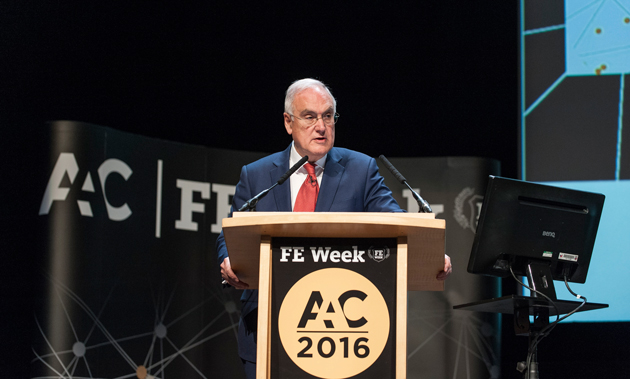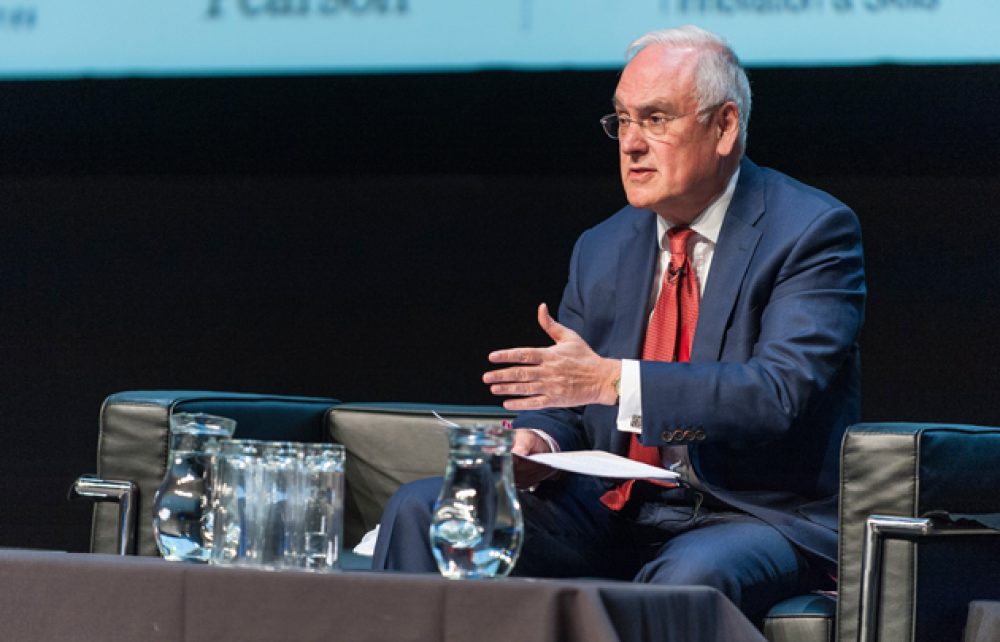Ofsted chief inspector Sir Michael Wilshaw has defended his controversial views about education for 16 to 19-year-olds, but denied that he is biased against the FE sector.
He made the remarks following his speech on Thursday, the second day of FE Week’s Annual Apprenticeship Conference at the Birmingham International Convention Centre.
“It’s not a bias, it’s criticism of what we see — and have seen for a number of years,” Sir Michael said when he was asked about his “publicly stated personal bias” against FE.
“You can’t tell me that the statistics on study programmes are good. In most colleges that we see, a very small proportion of youngsters are on apprenticeship programmes — you can’t tell me that’s good. No it isn’t good.”
The Ofsted chief inspector attacked the FE sector during an evidence session for the Education Select Committee on March 2, describing it as “in a mess — that’s why the government is reviewing it”.

“My view is that 16 to 19 should be done in school,” he told the committee, chaired by Neil Carmichael.
Sir Michael acknowledged the “controversy” his remarks had caused, but stood by them.
“The point I was trying to make is that when you look at the figures, it’s pretty dire,” he said.
“Those youngsters who don’t do well at the benchmark GCSEs at 16, in English and maths, two years later it’s just as bad.”
Mark Dawe, the incoming chief executive of the Association for Employment and Learning Providers (AELP), questioned Sir Michael’s lack of bias.
“When he talks there does still seem to be an FE bias,” Mr Dawe told FE Week.
“When you look at the evidence there is some really good provision and he should base his comments on the evidence and I don’t think he is fulfilling the chief inspector’s role by his personal views being aired,” he said.
The Ofsted boss, who will be retiring at the end of the year, acknowledged that that the new apprenticeship reforms, which could see the education watchdog having to inspect 4,000 training providers, “will present a challenge to Ofsted”.
During his speech Sir Michael criticised “colleges and other providers” for “not delivering high enough numbers of apprenticeships overall, and certainly not in the right areas”.
“Taking some local examples, two of the biggest colleges in this region have less than 10 per cent of their student population on apprenticeship courses. And these in colleges of nearly 30,000 students,” he said.
He also contrasted the quality of different types of apprenticeship provision.
“Most high-quality apprenticeships are found in industries that have long-established traditions of using them: the motor industry, construction and engineering.
“They are few in number and are largely delivered by long-standing industries and providers.
“On the other hand, the ever-increasing numbers of apprenticeships in the care and retail sectors are not consistently reaching the same high standards,” he said.
When he was asked whether this difference in apprenticeship quality related to how much the people delivering them were paid, Sir Michael said: “Those are internal problems for every provider”.
“It’s up to the leaders of those institutions to ensure that salary levels and professional development programmes are equitable across the different areas of curriculum,” he continued.
Sir Michael also criticised the quality of apprenticeships in small and medium-sized enterprises (SMEs), calling most of them “poor quality”.
“That’s what’s got to improve, and the only way to get apprenticeships to improve is if employers take ownership of quality, working with high quality training providers,” Sir Michael said.
“Most of our employers are SMEs — you know that. And yet they’re badly supported, and I have to say, badly led, by local employers,” he added.








There is a reason that “Most high-quality apprenticeships are found in industries that have long-established traditions of using them…” eg motor trade, construction, engineering. You get a decent wage when you’ve qualified.
Care and retail which Mr W is contrasting it with (“not consistently reaching the same high standards”), the wages are rubbish, you can barely make a living from it. It stands to reason that for occupations with not very good wage prospects, you are going to attract a less motivated and (dare I say it) less capable bunch of learners, so quality will be lower.
If there is any substance to the above, is that the fault of the FE sector?
Again Sir Michael demonstrates his lack of understanding of what the FE sector and particularly apprenticeships are all about. Considering his total disengagement with what goes on in the sector, that is not surprising. His predecessor, Christine Gilbert, at least visited outstanding provision such as Andrew Collinge in Liverpool, so that she could get a first-hand feel for what excellent apprenticeships are all about. He has not got his head around the fact that you can’t just ‘magic’ employers out of thin air to grow your apprenticeship provision. For example, in aeronautical engineering Virgin has not recruited apprentices for at least the last two years, even though there are usually between 50-100 applicants for every such apprenticeship. As a college I might have all the expertise and resources to support delivery of apprenticeships in that area, but can’t do it if the demand has dried up because of the economy. Yes, it must have all been very simple as a head teacher when he offered predominantly GCSEs and A levels (so how are schools meeting the needs of LEPs in the common inspection framework or do different rules apply to their development of curriculum?)and didn’t promote apprenticeships as an alternative route to pupils at 16, but hung onto as many 16-18 year olds as possible to boost funding.
I am not sure what the last sentence of this article is supposed to mean, is it a misquote or is Sir Michael now attacking SMEs who he says are ‘badly led by local employers’. Next week Nic Boles will no doubt come to his rescue again by saying he had not meant to say that. I reiterate the one overriding rule that Sir Michael does not stick to, that every inspectorate that has ever been has previously stuck to, YOU are not supposed to express personal opinions, but are supposed to foster improvement and inform government by expressing key judgements based on, and backed up by, FACTS.
“Those youngsters who don’t do well at the benchmark GCSEs at 16, in English and maths, two years later it’s just as bad.”
.
Some youngsters fail at school beacuase they do not want to put in the effort, are not interested in learning, have a poor attitude and treat their mobile phone as their highest priority. They then come to college and have take the same approach. Surprise, surprise, they fail again!
.
Is Sir Michael Wilshaw not able to figure out that the problem is often with the youngsters, not the college?
Time and time again I have seen colleges and providers turn young people onto learning and a career despite them being completely disengaged in their schools. This is generally part of an ethos of high expectations that give youngsters a ‘can do’ attitude. Good teachers don’t blame their students (as in a poor workman blames his tools) but work with them to do the thing that FE is best at, giving the opportunity for a second chance. The focus on getting a GCSE in English and maths is providing a distraction to the thing that customers of FE most want to get, a vocational qualification to help them get a job. It is a shame that the government does not ensure schools and the national curriculum are fit for purpose. When a youngster enters Year 10 and the school knows they will struggle to get the key English and maths GCSEs, why force them to do things like RE, a foreign language (surely getting English first is more of a priority?) and a subject like geography or history when they could double up the time to get five GCSEs. We have learnt the lesson from doing too many AS levels in SFCs where too many youngsters struggle with four, but thrive with three. It is such a shame that Ofsted have had insufficient focus on working out why so many of their outstanding and good schools let four out of 10 of their pupils down with English and maths, often abdicating further responsibility because they get a ‘pat on the back’ inspection grade from Sir Michael. If there is ever to be any semblance of a level playing field in inspection we need an Chief Inspector who has not got a vested interest in one part of their remit, but who cares about equal chances and inspection standards for all.
When you’re in a hole, stop digging ( unless you’re possessed of breathtaking arrogance and a rhino like skin). He was spouting tosh two weeks ago, it’s still tosh today. If hr truly believes all 16-19 ills will be solved by doing everything in schools and UTCs then he really needs to retire NOW.
17 years experience in apprenticeships tells me most employers haven’t got the time to sort out the quality. They want instant productivity from a school leaver. I think we are going into a very dangerous period and worry for the future of work based learning.